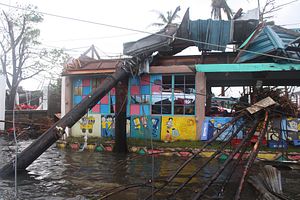Southeast Asia experienced numerous disasters in 2013: oil spills, dengue outbreaks, earthquakes, bus crashes, and massive floods. But the two biggest were the trans-boundary haze pollution that affected Singapore, Malaysia, and Indonesia; and super typhoon Haiyan (Yolanda), which wrought devastation in the central part of the Philippines.
The haze was caused by forest fires in Indonesia, but it had a greater effect on the lives of Singaporeans and Malaysians, although residents of Riau in west Indonesia, ground zero for the airborne pollution, must have suffered the most since they had to deal with both the forest fires and the haze.
Because of the failure to punish palm plantation companies that were mainly responsible for the burning of forests, the haze has become an annual plague in the three neighboring countries. But the haze last June seemed to be the worst in recent years, causing air pollution indexes to soar to record levels in both Singapore and Malaysia.
In an unprecedented move, Indonesian President Susilo Bambang Yudhoyono apologized to Singapore and Malaysia and accepted his country’s responsibility for causing the haze. However, his apology came after some of his subordinates created an uproar when they belittled the suffering of their neighbors.
Luckily for the Philippines, it was spared the black haze. But the haze would have seemed a minor inconvenience compared with the hellish impact of super typhoon Haiyan, which battered the Eastern Visayas region of the Philippines.
Haiyan was the strongest storm in the world in 2013, and the fourth strongest to make landfall in history. It caused a tsunami-like storm surge that instantly killed thousands. As of this writing, more than 6,000 have died, but the fatalities could be higher as relief workers continue to work through the debris in many villages.
In an instant, several towns in Samar and Leyte provinces were reduced to wasteland. Survivors lost their homes and livelihoods and many are in fact still sheltered in makeshift evacuation centers. There were complaints about the slow delivery of relief, and the government of President Benigno Aquino III was accused of being inept and inefficient in providing adequate assistance to typhoon victims.
The disaster highlighted the rapid degradation of the environment as well as the vulnerability of small island nations like the Philippines to the harsh impact of climate change.
Another catastrophe – this one man-made – was the widespread irregularities that marred the elections in Malaysia and Cambodia. Naturally, it ignited a maelstrom of protests in both countries.
In Malaysia, hundreds of thousands gathered in Kuala Lumpur, the country’s capital, to protest the outcome of the election that gave the administration coalition a slim majority. “Black 505” refers to the May 5 General Election that was tainted by allegations that the ruling coalition committed massive electoral fraud to remain in power. The ruling party, which has been in power since the 1950s, lost the popular vote but still retained a majority of parliament seats. The series of protests, which spread to other provinces, was also referred to as the “Malaysian Tsunami.”
In Cambodia, tens of thousands participated in numerous assemblies, marches and camp-ins organized by the opposition Cambodia National Rescue Party since September to protest the alleged manipulation of electoral results by the ruling Cambodian People’s Party. The ruling party won a slim majority after it took 68 seats compared to the opposition’s 55 seats. It was the ruling party’s worst electoral performance since 1998.
The opposition is still actively and successfully mobilizing people in the streets. The daily protests at Phnom Penh’s freedom park have greatly undermined the popularity of Prime Minister Hun Sen. In the past few days, thousands of garment workers have joined these rallies after the opposition expressed support for the nationwide strike organized by garment unions, which have been demanding a 100 percent increase in the monthly minimum wage of workers.
Meanwhile, the current political crisis in Thailand can also be linked to the low credibility of the electoral process. After weeks of being besieged by provocative street rallies, Prime Minister Yingluck Shinawatra announced that the parliament would be dissolved to make way for an election in February. Curiously, the opposition have said they will boycott the polls and instead have called for the creation of an unelected People’s Council.
Perhaps the opposition Democrat Party, which last won a nationwide election two decades ago, is only desperate to return to power, which explains its aggressiveness in pursing reform through unconstitutional and even undemocratic means. But it is not entirely wrong in its analysis that the electoral exercise has been undermined by corruption. Indeed, it is quite difficult to accept the voting outcome and equate it with the will of the people when it has been tainted by money politics. Hence, the Bangkok rallies can also be seen as a protest against the flawed electoral system.
As 2013 draws to a close, it’s important to remember the painful lessons from Southeast Asia’s experience with the haze and Haiyan on one hand, and the various election-related protests on the other.
The haze will return in 2014 if no regional effort is made to prevent forest fires in Sumatra. In the case of the Philippines, the aid that quickly poured into the country from across the globe must be used to enhance the country’s disaster resiliency and to rehabilitate the typhoon-ravaged towns.
As for governments accused of electoral cheating, the way forward is to substantially overhaul election laws and respect the reasonable demand to probe allegations of election manipulation.
Let us hope that 2014 will be a year with fewer disasters, both natural and man-made.

































